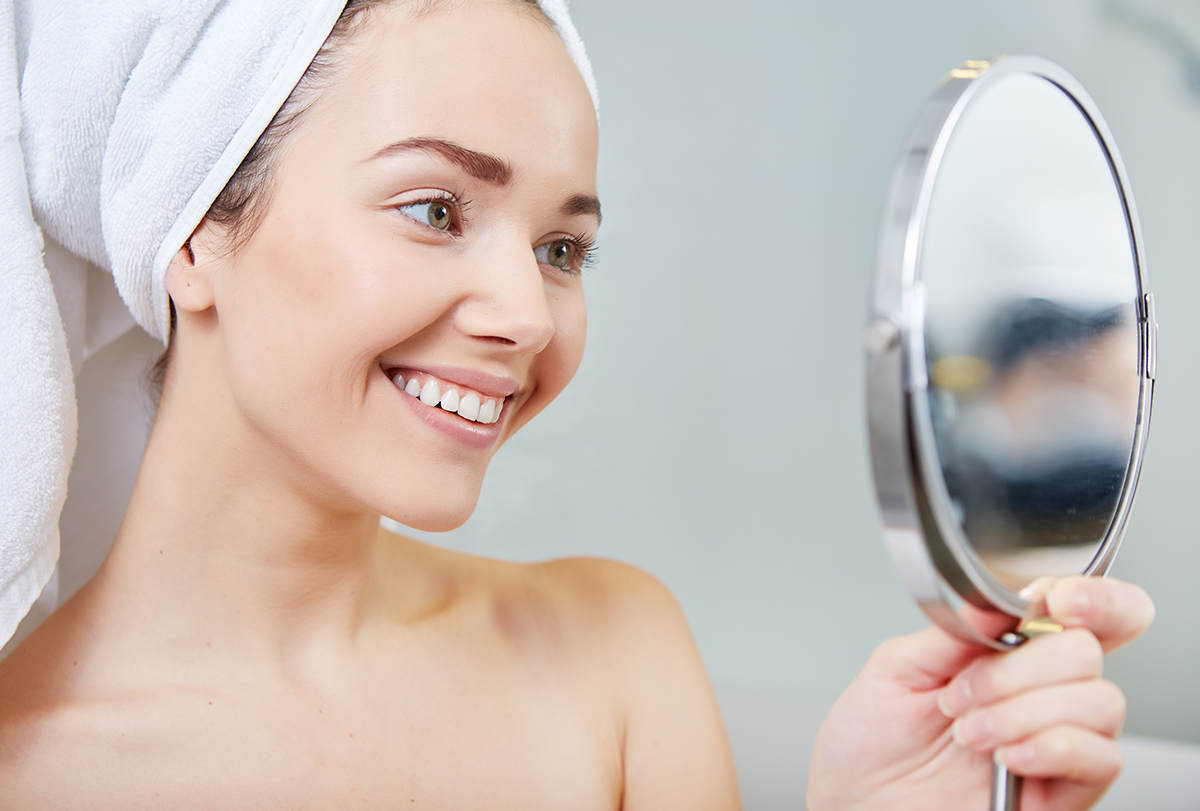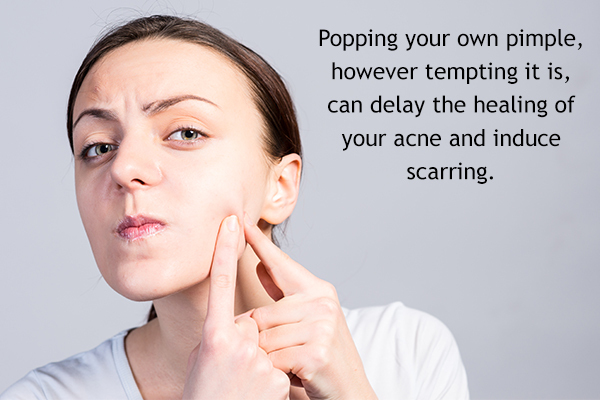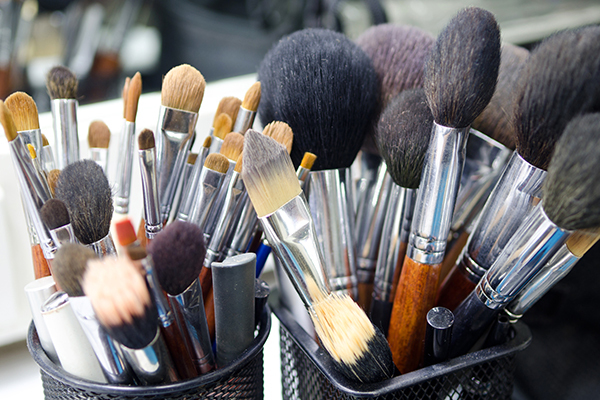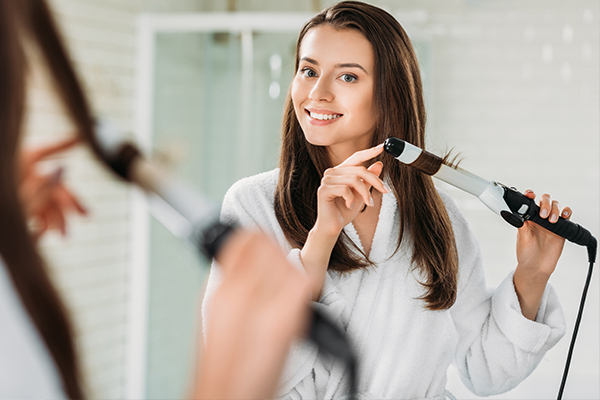In this article:
Many people are all guilty of trying out new beauty routines to pamper themselves, and at times, they end up doing more damage than good. Whether using the wrong product or following an age-old method, bad beauty habits have to be broken!

Here are 10 innocent beauty habits that have surprisingly negative influences on your skin, hair, and nails.
1. Sleeping Without Removing Your Makeup
It can be exhausting after a Saturday night dinner party or a friend’s wedding, and you can’t wait to hit the bed and call it a night. But sleeping with your makeup on can cause extreme damage to the skin.
Makeup can lead to clogged pores due to the overnight buildup of debris and excess oil in the skin, resulting in acne. Makeup increases the exposure of the skin to free radicals, which lead to the breakdown of the skin’s collagen and formation of premature wrinkles. (1)
Some makeup products contain harsh pigments, metals, and fragrances that can cause irritant dermatitis and exacerbate your rosacea.
Sleeping with makeup on will undeniably induce dryness and redness, increase the skin’s sensitivity, eventually leading to a hyperpigmented lusterless complexion.
What you should do
- No matter how tired you are, make sure that you remove every bit of makeup thoroughly from your skin as soon as possible.
- Use micellar water before bed, whether you wear makeup or not. It is an excellent way to cleanse all skin types.
- Micellar water is pH-balanced, alcohol-free distilled water infused with glycerine and surfactants. It removes every bit of grime and makeup from the skin in the gentlest way.
- Cleanse your entire face using soft cotton pads. You can use cotton buds to remove makeup residues in areas around the eyes.
2. Applying Too Much Hair Oil
Almost everybody has tried the “grandma-approved” application of hair oil in copious amounts through vigorous massage in hope of bringing dry and brittle hair to life.
The scalp and hair stay healthy and free of bacteria and fungi if maintained at a pH range of 4.5–5.5. (2) The health, thickness, and overall density of the hair fibers remain good when this level of acidity is maintained.
Applying too much hair oil interferes with this pH and can cause hair loss. Multiple shampooing to remove the oil further causes drying of hair, making it more brittle. (2) Moreover, certain natural essential oils are not water-soluble, so they stay on the hair shaft and scalp even after multiple hair washes, which can induce dandruff.
But then, why do some people actually find their hair softer after oiling?
This is because the shampoo doesn’t remove the oil completely, which, in disguise, gives a temporary solution to the hair dryness you are facing. In the long run, it doesn’t really do much!
What you should do
- Include the use of hair masks in your daily shampooing routine. Hair masks are rich creams incorporated with vegetable proteins, botanical extracts, amino acids, hydrolyzed lipids, and conditioners. A full scoop of hair mask can be applied once or twice a week to towel-dried hair after shampooing. Hair masks help only in deep conditioning dry, lusterless hair.
- For hair fall, it is important to see your dermatologist, who can identify the underlying cause of hair fall. They can advise peptide-based hair growth spray and treatments such as platelet-rich plasma therapy (PRP).
3. Popping Your Pimple at Home

Popping your pimple is very tempting, but it can delay the healing of your acne and induce scarring. It causes tiny breaks in your skin barrier, worsens inflammation, and spreads bacteria to adjacent areas of the skin.
So, next time you are standing in front of the mirror ready to pop that zit, do consider that you are forcing the debris, bacteria, and inflammation deeper into the pore, worsening the acne.
What you should do
- Resist the urge to touch your face or acne.
- See your dermatologist, who can identify the cause of acne (hormonal, acne cosmetica, certain medications, or plain genetic) and distinguish its type (comedones, papules, pustules, nodules, cysts). After the initial evaluation and maybe hormonal investigations, your dermatologist will be able to prescribe you some tablets, creams, or gels along with a daily regimen that suits your skin type.
- In-clinic treatments such as chemical peels and lasers can help treat acne, acne marks, and scarring. (3)
4. Using Water That Is Too Hot for Daily Showers
Hot showers are humble pleasures for most people and particularly soothing during harsh winters. As amazing as it feels, prolonged hot showers are detrimental to your overall skin health. It does not only strip the skin of its good natural oils, but it can also induce dryness, inflammation, and itching.
Individuals with dry skin tend to have impaired epidermal barrier with a deficiency of ceramides in the skin that help keep the skin moisturized. (4) This skin type is prone to eczema, which can be aggravated by steamy hot showers.
What you should do
- Use lukewarm water for showers and pH-balanced non-soap cleansers and moisturizing body washes that are free of sodium lauryl sulfate.
- Avoid using loofahs or harsh sponges as it can cause more dryness, inflammation, and darkening of the skin.
- Apply a good barrier-repair moisturizer to your entire body immediately after patting your skin dry following a shower; do not rub your skin.
- Alternatively, you can apply dry oils such as jojoba oil, borage oil, and sunflower seed oil to your skin before bed as they help to restore the skin barrier and soothe the skin due to their anti-inflammatory properties.
5. Vigorous Exfoliation
Yes, using a scrub is great for your face and your body as long as it exfoliates the skin gently. However, using harsh scrubs with sharp granules too often will only damage the skin’s first protective layer, making your skin feel raw and sensitive.
It can increase the likelihood of UV damage and sunburn that can cause hyperpigmentation, leaving your skin looking tanned and lusterless.
If you have flaky and cracked skin, do not use a scrub assuming that it will smooth the skin out. Flaky and cracked skin requires moisturizing and healing with the right use of medicated creams and barrier repair moisturizers.
What you should do
- Use a mild scrub with small round gentle granules in a cream base.
- Do not use scrubs containing sharp granules (such as ground shells), menthol (such as peppermint), or too much fragrance of any kind.
- Ideally, a gentle scrub should be used only once or twice a week and must be rinsed with normal-temperature water.
6. Tweezing Out Ingrown Hair
When a hair follicle is clogged with dead skin and the hair is shaved/cut off, the sharp end of the hair grows sideways and pierces back into the skin, forming an ingrown hair.
People with curly, coarse hair are more prone to an ingrown hair. It can cause redness and inflammation on the skin, overlying it.
As this hair doesn’t come off easily with waxing or shaving, most people try to pick them out with a pair of tweezers. Doing this can cause pain, infection, cysts, folliculitis, itching, and eventually pigmentation or scarring.
What you should do
- If you have an occasional ingrown hair, wait it out instead of plucking or waxing it.
- If you chronically tend to have ingrown hair, laser hair removal is one of the best solutions for you.
- In cases of infection or inflammation over an ingrown hair, see your dermatologist for the right medication and treatment.
7. Not Washing Makeup Brushes

If you have never washed your makeup brushes, you will be surprised to know the amount and variety of microbes budding on your sponges and brushes.
Studies have microbiologically detected Staphylococcus, Streptococcus, Pseudomonas, E. coli, and Candida on samples of makeup tools and brushes, which are threatening to your skin and overall health. (5)
Not washing your makeup brushes can cause contamination of your tools with these microbes and cause dermatitis, acne, folliculitis, and other fungal skin infections.
Mascaras, kajal pencils, and eyeliners tend to grow more yeasts than bacteria and can cause a lot of eye infections if not kept clean. (5)
Golden rule: Never share your cosmetics and makeup tools!
What you should do
Makeup brushes and tools can be cleaned using products that are present in everyone’s shelf. All you need is a tall jar (enough to hold your brushes), shampoo, liquid Dettol, and a towel.
- Fill the jar with hot water (not boiling), add liquid Dettol, and pour in some shampoo.
- Add all your brushes, sponges, etc., in it, swirl them, and let them soak for 20 minutes.
- Remove each brush one by one, use shampoo to create good foam, and rinse with cold tap water (to keep the bristles soft). Wash the entire brush, including the handles so that it is completely clean.
- You can also use a silicone textured brush and cleaning mats or pads (easily available online) for more effective cleaning of the bristles.
- Set these brushes on a towel and let them air-dry.
8. Not Wearing Sunscreen or Choosing a Wrong One
Photoprotection means the prevention of detrimental effects on the skin, such as pigmentation, premature aging, tanning, sunburns, cancer, and allergies, that are caused by UV radiation from the sun.
Not wearing sunscreen daily can cause all the above troubles for your skin. But if you do wear a sunscreen every day, make sure you wear the right one, at the right time, in the right amount.
Some non-medicated sunscreens with poor formulations can induce acne, allergic dermatitis, and ineffective photoprotection and will only make you look greasy. Do not apply thin streaks of sunscreen with skipped areas as it will lower the SPF indicated on the tube.
What you should do
- The best way to wear sunscreen is to apply a generous amount of it to clean and dry skin and to reapply it every 2–3 hours, especially between 10:00 am and 4:00 pm.
- See a dermatologist who can suggest a sunscreen that suits your skin type and concerns. Gel-based mattifying sunscreens are best for acne-prone/oily skins, whereas moisturizer-based sunscreen would suit dry/aging skin.
- There are special water-resistant sunscreens for children that offer only a physical block to UV rays without any harmful chemical ingredients.
- For the body, sunscreen sprays are available that offer good protection and coverage, plus they are easy to apply!
- Usually, a broad-spectrum sunscreen with a minimum SPF of 40 that offers full protection against both UVA and UVB rays is advisable. (6)
- Don’t forget the lips – use a moisture-rich lip balm with SPF 15 or more daily.
9. Using Hair Styling Products Too Often

This is applicable to both men and women who use too much hair styling products every single day.
It can be anything – hair-fixing sprays, hair gels, mousse, styling creams, hair wax, texturizing sprays, curling creams, hair irons, blow dryers, curling wands, and so on.
The use of these products once in a while is absolutely fine, but using it every single day or too often will cause dry, brittle hair shafts, eventually leading to hair loss.
Provokers such as heat, over manipulation, polymers, colors, and chemicals break open the cuticle (outer layer) of the hair shaft, making your hair frizzy and lifeless.
What you should do
- Use styling products sparingly.
- Once used, styling products must be washed off as soon as possible with a good shampoo, followed by an application of a moisture-rich creamy hair mask. Hair masks close the cuticles, sealing in all the moisture and making the hair soft, smooth, and manageable.
10. Frequently Applying Gel Nails
Although gel nails look fabulous and are long-lasting, they can cause a lot of damage to your nails if done frequently. They can cause nail brittleness and discoloration due to dehydration and thinning of the nail plate.
Once the color begins to peel off, most women are tempted to lift off the color like a scab on their own, which can lead to nail plate damage. The nails are exposed to high-intensity UV light during the gel manicure process that can damage the surrounding skin as well.
The removal of gel nails involves wrapping the nails in aluminum foil with concentrated acetone and then using a file, which further causes nail thinning and damage.
What you should do
- Get gel nails before vacations or just for important occasions. Don’t make it a lifestyle.
- Use alternatives such as gel-like nail polishes that give you a similar finish and last for more than a week.
- Hydrate and nourish your nails with nail strengthening lotions and good cuticle oils rich in vitamins and emollients.
- If you have brittle nails, ask your physician to prescribe you some biotin supplements that can help restore your nail condition. (7)
Final Word
You have to be consistent with your skin and hair care regimen for it to show positive results. However, this does not mean overdoing it, which can have the opposite effect.
Some people have the misconception that the more you clean your hair and skin, the healthier they will be. But touching your skin too much or washing your hair too often can strip away their natural moisture and leave them dry and irritated.
Be mindful of the products you use, and always be gentle when handling your skin or hair. The body goes in a natural state of decline as you age, but you can delay this process by starting a proper skin and hair regimen early in your life.
- Was this article helpful?
- YES, THANKS!NOT REALLY


